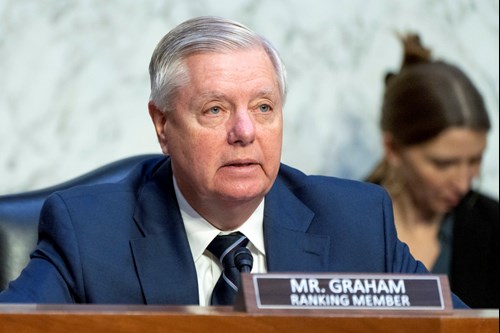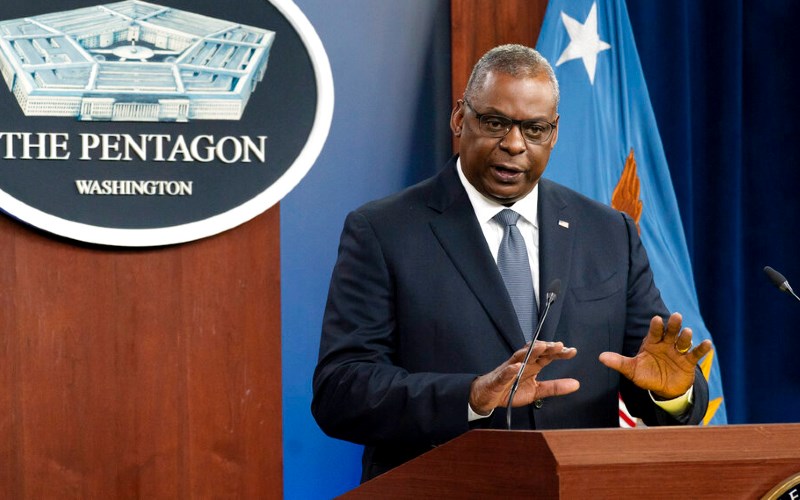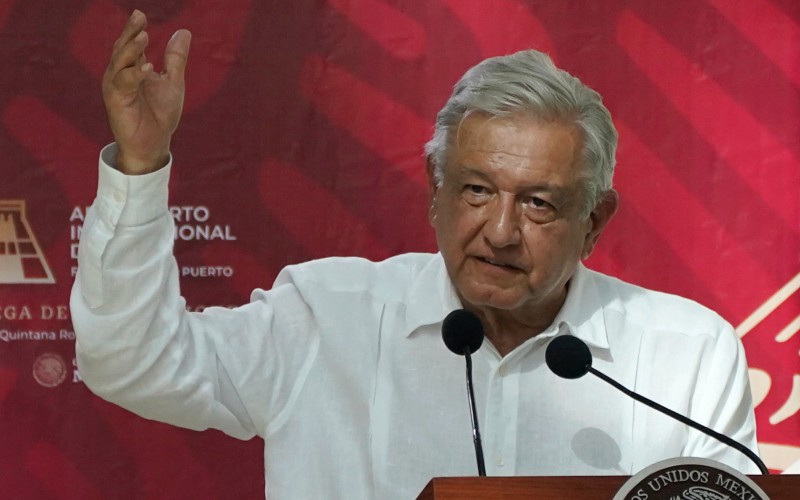There have been 103 known attacks against U.S. forces in the Middle East since Oct. 17, Fox News has reported. Twenty-one of those have been attacks against ships in the Red Sea by Yemen Houthis.
Defense Secretary Lloyd Austin (pictured above) last week announced the formation of a multi-national naval coalition aimed at restoring order to the Red Sea, a shipping channel capped by the Suez Canal that is critical to the transport of goods for many nations. It's a wobbly alliance that includes notable European powers like Great Britian, France and Italy, but not important Middle East players like Egypt and Saudi Arabia.
Not enough is being done, and Sen. Lindsey Graham (R-South Carolina) lays the blame squarely on Austin's shoulders.
"Sec. Lloyd Austin and the Biden administration are failing our troops in the field. I admire him; he's a patriot – but he's not doing a good job protecting the soldiers," Graham said on Fox & Friends Wednesday morning.
 Graham said there appears to be no real tipping point for Austin.
Graham said there appears to be no real tipping point for Austin.
Graham: Germans, Japanese > Houthis
"We're fighting the Houthis. We beat the Germans and the Japanese; we should be able to beat the Houthis. I asked him [Sec. Austin] a few months ago, 'Is there a red line? Would you tell our enemies publicly that if you kill an American, we're coming after you?'" the South Carolina lawmaker said.
In Iraq, ground troops are coming under fire two decades after former President George W. Bush declared an end to major combat operations in Iraq and 12 years after former President Barack Obama declared an end to the war in Iraq.
"Everybody that's in the region is coming under fire, and you have to do the things that are needed to protect the folks who are there. The problem is we're not going after the real issue, which is Iran," Ret. Air Force Gen. Rob Spalding told Fox.
"Iran's leaders have started this war, and unfortunately we haven't acknowledged it and haven't done anything about it to dissuade it, so we're going to see the attacks continue."
While Iran attacks U.S. personnel with its proxies, it's also working hard to strengthen its own nuclear capabilities in violation of the Joint Comprehensive Plan of Action signed by Iran, the U.S. and other world powers in 2015. The main objective of that agreement was to slow Iran's nuclear program. Uranium enriched to 90% strength is required to produce nuclear weapons. Fox reports that Iran was at 20% before JCPOA but is at 60% now.
The Houthis, numbering 200,000 troops in 2021, are just one of Iran's proxies, according to U.S. intelligence.
"Without Iran there are no Houthis. The Houthis are completely backed by Iran. I've been saying this for six months now: Hit Iran. They have oil fields out in the open. They have the Revolutionary Guard headquarters you can see from space. Blow it off the map. If you really want to protect American soldiers, make it real to the Ayatollah: [Tell them] 'You attack American soldiers through a proxy, we're coming after you,'" Sen. Graham said.
 Spalding agrees. He notes forceful foreign policy of other U.S. presidents and the desired results their actions produced.
Spalding agrees. He notes forceful foreign policy of other U.S. presidents and the desired results their actions produced.
"Back in the Reagan administration, the Libyans were being provocative in much the same way. Essentially, Reagan sent aircraft to strike targets within Libya, and all of that went away. If you go back to the Trump administration and the attack on Gen. Qassim Suleimani, Iran quieted down pretty quickly," Spalding said.
Suleimani rose to power through Iran's Revolutionary Guard and is credited for shaping Iran's foreign policy with Syria and Iraq. He was 62 when he was killed by a U.S. drone strike near the Baghdad airport in 2020.
"You have to show them that you are serious, and they have to feel threatened. The Iranian leaders have to feel threatened. The other thing we have to consider, if this uranium enrichment continues, is that we're likely to see an attack [against Iran] from Israel, if not the United States," Spalding said.
Graham said America should be on guard for an attack on the homeland. Security has deteriorated since the Biden administration's withdrawal from Afghanistan early in Biden's presidency, he said.
Graham: Some troops in the hot spots are necessary
Graham favors keeping some number of American troops in the Middle East even when America is not officially at war with anyone.
"After Afghanistan, all these nut jobs are on steroids. My view is to work with people in the region who reject the ideology and keep them disrupted over there. You can fight them in our backyard or their backyard. I pick our backyard to be safe, their backyard to fight. You can have it with allies or do it by yourself. I pick allies.
"You don't need 100,000 troops, but you need some people who will get in their face in Afghanistan so they don't have time to hit America. That's the only way to be safe in this war, and over the arc of time people in the region will change. You see Saudi Arabia changing," Graham said.







